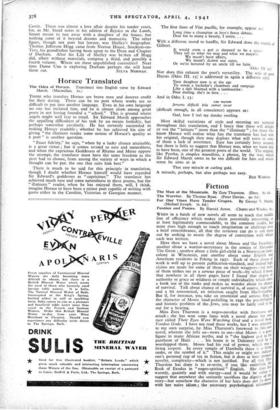Horace Translated
The Odes of Horace. Translated into English verse by Edward Marsh. (Macmillan. 6s.)
THOSE who translate Horace are brave men and deserve credit for their daring. There can be no poet whose works are so difficult to put into another language. Even in his own language no one has imitated him, and he is almost alont among great poets in not having founded a " school." This is ground where angels might well fear to tread. Sir Edward Marsh approaches the appalling difficulties of his task by no means foolishly, but perhaps somewhat cavalierly. He has certainly succeeded in making Horace readable ; whether he has achieved his aim of giving " the illatinate reader some notion of Horace's quality as a poet " is another question.
" Exact fidelity," he says, " when by a lucky chance attainable, is a great virtue ; but it comes second to ease and naturalness, and when the capricious Goddesses of Rhyme and Metre oppose the attempt, the translator must have the same freedom as the poet had to choose, from among the variety of ways in which a thought can be put. the one that suits him best."
There is much to be said for this principle in translation, though I doubt whether Horace himself would have regarded Sir Edward's goddesses as " capricious." The translator has achieved much ease and some naturalness in these poems, but the " illatinate " reader, when he has enjoyed them, will, I think, imagine Horace to have been a minor poet capable of writing with gusto either in the Caroline, Victorian or Georgian manner. The first lines of Vixi puellis, for example, appear as:
Long time a champion in love's fierce debate, Dear foe to many a beauty, I retire. ...
With a different mood to handle, Sir Edward dons the mantle of
Gilbert. It would seem a girl is doomed to be a saint: They tell us what we may and what we mayn't: We musn't have affairs, We musn't down our cares, Or we're lectured by an uncle till we faint.
(Odes III 12.) Nor does this exhaust the poet's versatility. The wife of poor Ibycus (Odes III. 15) is addressed in again a different style.
Your daughter now is at the age To storm a bachelor's chambers and rampage Like a daft Maenad with a tambourine: Poor darling. she's in love. . . .
And in Odes I. 13:
vae meum fervens difficili bile :umet iecur
(difficult enough, in all conscience) appears as: God, how I !eel my dander swelling.
Most skilful variations of style and meaning are scattered throughout this translation, and I fancy that these will delight or vex the " latinate " more than the " illatinate " ; for those who know Horace will realise what fun the translator has had with his original, though they may deplore what will seem to some of them a lack of reverence. Ease has certainly been secured, but there is little to suggest that Horace was, what we know him to have been, one of the greatest poets of the world. The original, like Pyrrha, is simplex munditiis, a phrase, by the way, which Sir Edward Marsh owns to be too difficult for him and whose sense he aims at in
That easy miracle of curling gold.
A miracle, perhaps, but also perhaps too easy. REX WARNER.


























 Previous page
Previous page